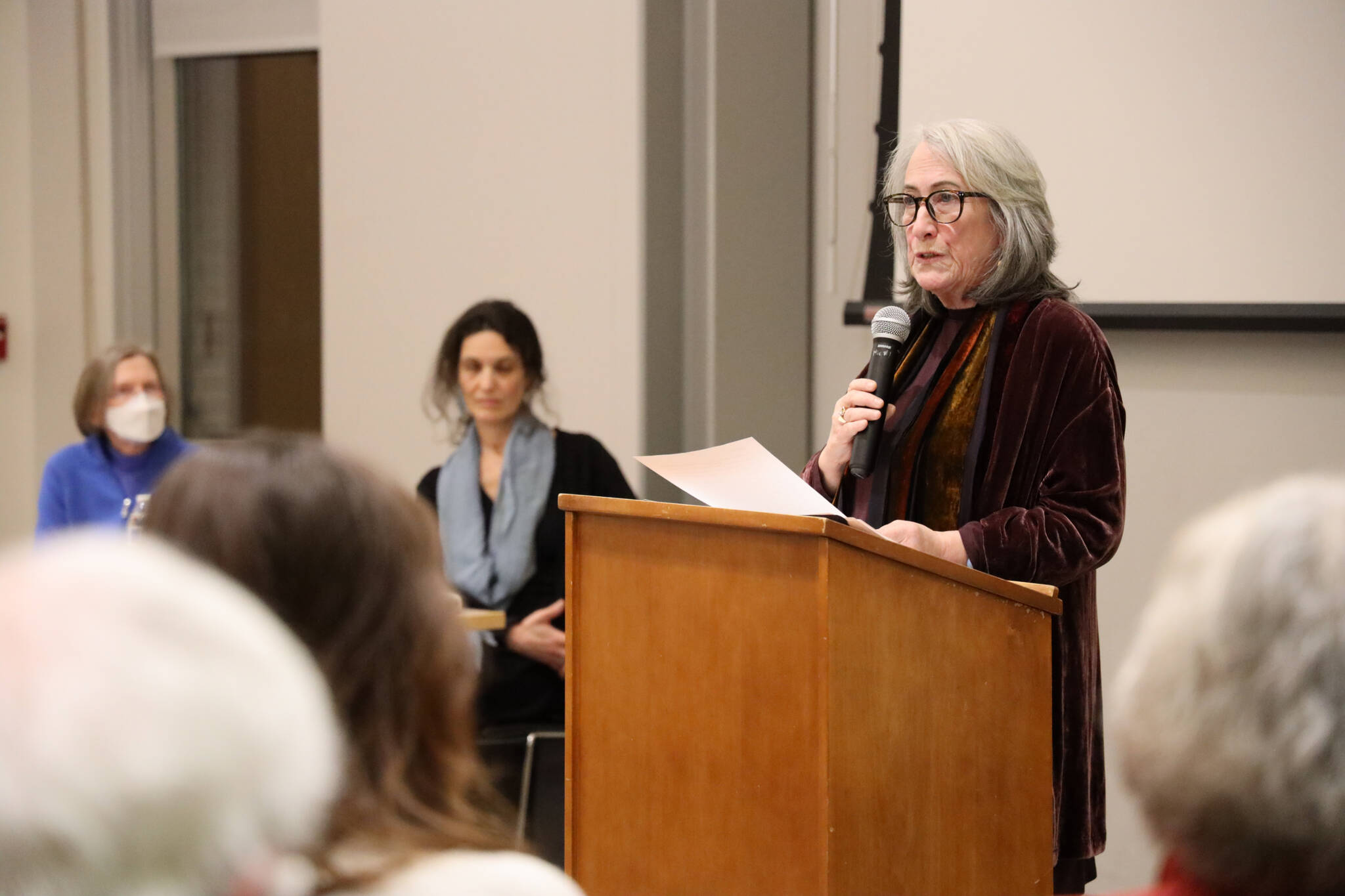For Rebecca Braun, her family’s Holocaust story is a constant reminder about the importance of helping people like Ukrainians escape from their war-torn country as her family did during the Nazi regime.
“I am able to tell this story because we were the lucky ones — there is no one to speak for many of those who were killed,” she said.
More than 75 people crowded the Mendenhall Valley Public Library Tuesday evening to listen to and witness a four-person panel featuring Juneau residents Rebecca Braun, Eva Bornstein, Helena Fagan and Sheryl Weinberg, who shared their families’ personal stories of loss and survival during the Holocaust.
Family Stories — Juneau and the Holocaust, was the final event that ran in tandem a traveling exhibition from the U.S. Holocaust Memorial Museum, “Americans and the Holocaust,” that was on display at the library. The traveling exhibition examined the American response to Nazism, war and genocide during the state-sponsored, systematic murder of 6 million Jews and millions of others, including LGBTQ+ people, Romani people and prisoners of war by Nazi Germany in the 1930s and 1940s.
Overcoming intergenerational trauma
Helena Fagan shared two excerpts of a memoir she is writing about her mother’s story of her narrow survival from the terrors of the Holocaust and Auschwitz concentration camp as a young girl, and how her mother’s traumas reverberated into her own life as inherited trauma.
Through powerful narrative and expository writing, Fagan shared the terrifying stories that her mother told her as a young girl, which then intertwined with Fagan’s own journey growing up with the heavy burden of caring for her mother and the trauma she placed on her. Through the excerpts she brought the audience through her journey of exploring who she is as the daughter of a survivor and how she has learned to overcome the inherited trauma through connection with others.
In her own words
Eva Bornstein also shared her mother’s story of survival when German troops occupied Hungary, but unlike the other speakers, the audience was able to hear Bornstein’s mother’s story in her own words, as she had written it prior to her death.
Bornstein walked the audience through her mother’s journey via slideshow presentation and reading excerpts of her mother’s story of surviving the Nazi regime in Hungary, where she endured brutality, cruelty and forced labor all as a young teen.
Fighting for change
During her speech, Sheryl Weinberg admitted she didn’t know much about her Polish father or his family after he died when she was just 11. She shared It wasn’t until she was an adult that she learned of the many losses her family endured during the Holocaust and how her story of mourning the realization that she never knew them.
“Their memory is a blessing,” she said, invoking a Jewish phrase of mourning.
Weinberg also shared a story about her mother, who was also Jewish and lived in Juneau for the last eight years of her life. Weinberg explained when her mother died, she requested she not be embalmed as it is a Jewish religious belief and be sent to Arizona where her husband was buried. However, at the time in 2003, Alaska public health law prohibited bodies from crossing state lines unless they had been embalmed.
Weinberg explained though she received a waiver to grant her mother’s request, she wanted to make sure no other family in Alaska had to face that law that went against their religious beliefs. So, she brought her case all the way to Alaska’s Capital where the law was successfully repealed in 2006 largely thanks to her efforts to start the conversation.
A narrow escape
Rebecca Braun shared her grandparent’s and father’s stories of escape and immigration to America from Austria just before it was annexed by the Nazi regime in 1938. During that time, two of her father’s cousins were also able to escape, thanks to the help of Gilbert and Eleanor Kraus who rescued them, and 48 other Jewish children from Vienna, Austria and brought them to the U.S. in 1939.
Earlier this year, Braun’s synagogue, Congregation Sukkat Shalom, was a part of the citywide effort that sponsored the first refugees from the war in Ukraine to seek haven in Juneau, Ivan and Iryna Hrynchenko. During the process to help raise funds to bring the family to Juneau, the effort received a grant from the Gilbert and Eleanor Kraus Initiative for Immigrant and Refugee Justice, named after the same people who rescued her cousins decades earlier.
“When I heard the name, it overwhelmed me with a sense of rightness, of something coming full circle,” she said. “We knew what it is to be vulnerable, to be displaced, to be dependent.”
Braun said if it weren’t for people like the Kraus family and others who offered their hands to her family and millions of Jewish families during the Holocaust, the stories of what had happened couldn’t be told like the stories she shared Tuesday night.
“We know that humans have the power to commit unimaginable crimes against other humans, we have done it through enslavement, through systemic efforts to exterminate Indigenous peoples through genocide — we have done it time and time again — Jews are not the only people who have been targeted,” she said, “We tell our story as an urgent plea to stay ever vigilant.”
• Contact reporter Clarise Larson at clarise.larson@juneauempire.com or (651)-528-1807. Follow her on Twitter at @clariselarson.

